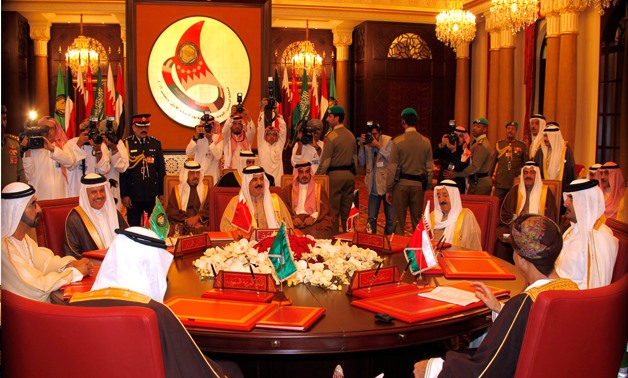
GCC summit in March 2014 - Al Kuwaityah
CAIRO – 10 July 2017: The diplomatic crisis that erupted on June 5 between Qatar and three other Gulf Cooperation Council (GCC) countries, along with Egypt, was due to an accumulation of Qatari wrongdoings and interventionist acts in the MENA region.
Ambassadors Withdrawal Crisis
In March 2014, Saudi Arabia, the United Arab Emirates and Bahrain withdrew their ambassadors from Qatar, which breached the Riyadh Agreement signed in November 2013. Qatar pledged in that agreement that it would not intervene in the internal affairs of GCC countries “directly or indirectly”.
Through the mediation of Kuwait, the three countries returned their ambassadors in November 2016. “Qatar is bound to implement the terms of the Riyadh Agreement, defining the mechanisms and framework to end the dispute between Qatar and GCC countries,” the GCC statement mentioned.
GCC’s objections to Qatari pro-terrorism policies
The agreement followed GCC countries’ protest to its support for terrorist groups, igniting civil war in neighboring Arab countries, such as Syria, Libya, Iraq and Yemen.
Qatar is accused of funding Fateh al-Sham, formerly known as Nusra Front, in Syria, as well as funding the Islamic State (IS) in Iraq.
Libyan Military Spokesperson Ahmed el-Mesmary revealed in a press conference on July 5 the Qatari role in funding and providing weapons, ammunitions and training to terrorist militias in his country. El-Mesmary affirmed that his state would sue Qatar internationally for its crimes.
.jpg)
Infographic by Ahmed Hussein
GCC countries refuted Qatar’s blatant backing of the outlawed Muslim Brotherhood in Egypt, as it harbored in Doha many of the Brotherhood’s leaders convicted in terror lawsuits, as well as continuously attacking Egyptian people for ousting the Islamist regime.
GCC countries also have been objecting “hostile campaigns” launched through the Qatari mouthpiece Al Jazeera. These campaigns have been against most of the Arab regimes in favor of Islamist and extremist opposition.
Qatar has been supporting the terrorist guerrilla group Hamas based in Gaza Strip and hosting its leaders in Doha. The group poses a threat to Egypt’s national security, as its militants cross the borders to execute terror operations against security ambushes in North Sinai. Hamas gained rule in Gaza as a political party in January 25, 2006 through elections, which have been the last since then.
GCC’s dissent to Qatar’s alliance with Iran to destabilize the region
Lebanon
Qatar has been close to Iran, the enemy of most GCC countries. Qatar has been supporting the terrorist guerrilla group Hezbollah funded by Iran in Lebanon. Hezbollah implicated Lebanon in a war against Israel in 2006.
In that year, Israel imposed a blockade on Lebanon from July 12 through August 14, for a total of 34 days, because of the missile attack launched by Hezbollah against Israeli border towns in an attempt to release Hezbollah prisoners. The incidents resulted in 1,191-1,300 Lebanese casualties, mostly civilian, and 165 Israeli casualties, including 44 civilians, according to the BBC.
Around one million Lebanese and 300-500,000 Israelis were displaced, and Lebanese infrastructure was destroyed.
Kuwait
A phone call between the Qatari Prince’s advisor, Hamad bin Khalifa Al Atteya, and a Bahraini terrorist called Hassan Ali Mohamed Gomaa Sultan taking place in March 2011 was leaked mid-June.
Sultan was transferring information on the security forces that spread throughout Bahrain in 2011 due to the riots that broke out, inititiated by some Iran-backed Shiite groups. The call also included settling on one of these groups’ representatives to talk on Al Jazeera.
Yemen
Qatar supports the Shiite Houthi militias, which are fighting the internationally-recognized government of President Abdrabbuh Mansour Hadi in order to take over the rule in Yemen. Hadi was elected president in February 2012, after having been the vice president from 1994 to 2012.
Saudi Arabia
Qatar also plays a role in destabilizing Saudi Arabia by funding groups launching terror attacks targeting civilians and holy places.
.jpg)
Comments
Leave a Comment